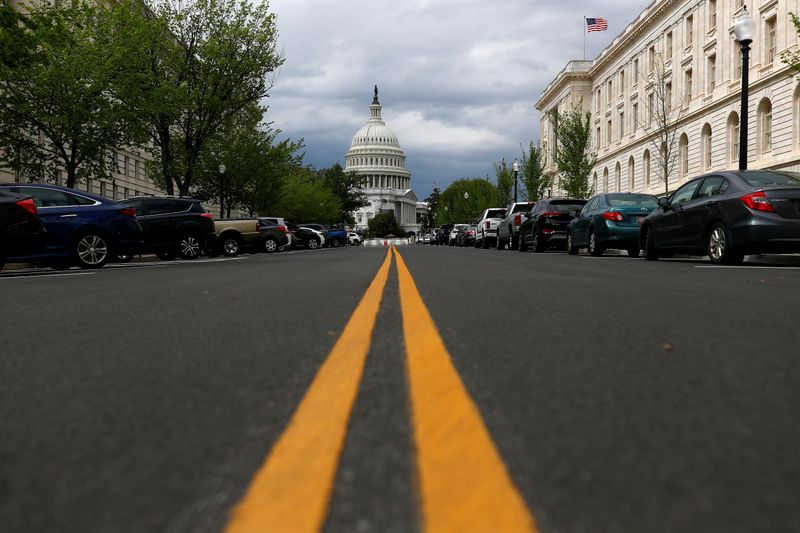For central banks, hope for precision fades amid pandemic uncertainty

For central banks, hope for precision fades amid pandemic uncertainty
FILE PHOTO: The U.S. Capitol dome is pictured ahead of a vote on the additional funding for the coronavirus stimulus economic relief plan, amid the coronavirus disease (COVID-19) outbreak in Washington
By Howard Schneider and Leika Kihara
WASHINGTON/TOKYO (Reuters) - Central bankers who have spent a generation researching how their words influence the economy and honing the craft of "forward guidance" are now effectively tongue-tied by a health crisis that has no clear destination yet to guide households and investors toward.
With everything from depression to a sharpish recovery possible over the next six months, the language from Washington to Tokyo has included broad pledges of central bank support for years to come, but little precision about what will happen next or when. The situation is counter to what a growing body of research says central banks should do in a crisis, and one the Fed in particular may move to correct in weeks ahead as its response to the pandemic approaches a new phase.
According to a crisis playbook that was taking shape at the Fed over the last year, that next phase would involve more specific statements about the scope of actions like bond purchases, how those purchases connect to efforts to keep longer-term interest rates lower, and what needs to happen to a sky-high unemployment rate before the central bank even considers slowing down.
Analysts feel that shift by the Fed may begin as soon as its meeting next month, though officials for now say the outlook is too uncertain to allow or require precise plans.
"Once we have a better idea of what the outlook looks like, what the unemployment rate will stabilize at once it peaks and then it comes back down, then we're going to be better positioned" to offer more direction about the future path of policy, Chicago Federal Reserve President Charles Evans told reporters last week. "We have the time to think about this."
Policymakers last week got an initial glimpse of the pandemic's economic fallout when the U.S. unemployment rate hit 14.7%, topping the peak in the 2007 to 2009 Great Recession. It was the first full-month tally of joblessness since the outbreak triggered widespread stay-at-home orders in March.
It also provides a baseline bit of data for the debate among Fed officials over what to say beyond their current promise that their target interest rate will remain near zero until they are "confident that the economy has weathered recent events."
Other major central banks have been similarly generic in recent communications, offering some version of the now-familiar promise to "do whatever it takes" to get through the crisis.
In Japan, that has involved a pledge to keep interest rates low or falling until the pandemic passes. To go beyond that, BOJ Governor Haruhiko Kuroda said recently, "won't be clear about how long we will keep rates low or possibly cut them," because the path of the pandemic remains so uncertain.
The Bank of England meanwhile veered from previous Governor Mark Carney's initial effort to tie rate increases to the unemployment rate - a strategy researchers have found to be an effective steer - to the broader, vaguer language of the pandemic era.
"However the economic outlook evolves, the Bank will act as necessary," new Governor Andrew Bailey said last week.
Even the European Central Bank, where the accretion of new programs over recent years has built perhaps the most elaborate policy structure among major central banks and the lengthy guidance to go with it, has had to hedge about what to expect.
A centerpiece bondbuying program started in response to the crisis will remain under way until the ECB's Governing Council "judges that the coronavirus crisis phase is over," a point that may prove difficult to assess or vary across eurozone countries.
UNWELCOME IMPRECISION
The lack of precision is seen as necessary given the unpredictable path of a health crisis that was at first downplayed by central bank officials as little more than a short-term disruption - until it hit them full force and in a matter of weeks threw the global economy into recession.
Research in recent years, including papers the Fed commissioned as part of a monetary policy framework review, recommended differently: That monetary policy works best in a crisis when officials tie promises of low rates or other actions to reaching specific goals like unemployment dropping to an identified level.
Reprinted from Yahoo Finance, the copyright all reserved by the original author.
Disclaimer: The content above represents only the views of the author or guest. It does not represent any views or positions of FOLLOWME and does not mean that FOLLOWME agrees with its statement or description, nor does it constitute any investment advice. For all actions taken by visitors based on information provided by the FOLLOWME community, the community does not assume any form of liability unless otherwise expressly promised in writing.
FOLLOWME Trading Community Website: https://www.followme.com


Hot
No comment on record. Start new comment.